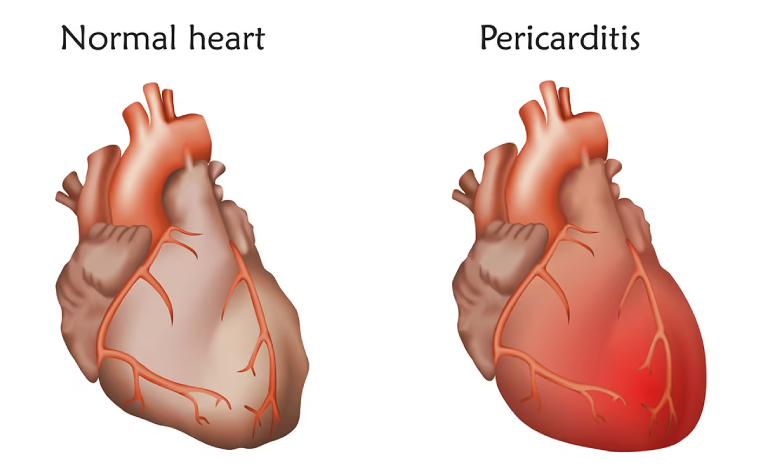
Early Signs That You May Need Pericarditis Treatment in Hyderabad
Chest pain can be a terrifying experience. Often mistaken for a heart attack, it may sometimes point to a lesser-known but serious condition—pericarditis.
Pericarditis is the inflammation of the pericardium, the protective sac that surrounds your heart.
When ignored, it can lead to complications such as pericardial effusion or even cardiac tamponade, both of which require immediate medical attention.Recognizing the early signs can be life-saving, especially when you have access to expert pericarditis Treatment in Hyderabad.
Hyderabad has emerged as a leading city for cardiac care in India, offering access to world-class cardiologists, cutting-edge facilities, and compassionate treatment. One such renowned expert is Dr. A Sai Ravi Shanker, an interventional cardiologist with over 20 years of experience in managing complex cardiac conditions, including pericarditis and related complications.
What Is Pericarditis?
Pericarditis refers to inflammation of the pericardium, often resulting from infections, autoimmune diseases, trauma, or post-surgical complications. The condition can be acute (sudden onset) or chronic (long-lasting), and may vary in severity.
When left untreated, pericarditis can lead to the accumulation of fluid around the heart, a condition known as pericardial effusion, which can further strain the heart’s ability to function effectively. Fortunately, timely diagnosis and pericarditis treatment in Hyderabad can help avoid such outcomes.
Key Early Signs of Pericarditis
Understanding the symptoms of pericarditis can help you seek medical intervention at the right time. Here are some early signs to watch out for:
-
Sharp or Stabbing Chest Pain
The hallmark symptom of pericarditis is sharp, stabbing pain in the chest. It usually worsens when lying down and improves when sitting up or leaning forward. Unlike the dull pressure associated with a heart attack, pericarditis pain is often more localized and sudden. -
Pain Radiating to the Shoulders or Neck
In some cases, the pain may spread to the shoulders, neck, or even back. This is due to the inflammation irritating surrounding nerves and tissues. -
Shortness of Breath
As inflammation increases, it may cause fluid buildup, leading to difficulty in breathing, especially when lying flat. -
Fatigue and General Weakness
Pericarditis can make you feel unusually tired or weak, even with minimal activity. This is often due to the body’s immune response to inflammation or underlying infection. -
Fever and Chills
If the cause of pericarditis is viral or bacterial, fever and chills may also be present. Persistent fever combined with chest pain should never be ignored.
If you or a loved one experiences any of these symptoms, seeking prompt medical advice for pericarditis treatment in Hyderabad is crucial.
Diagnosing Pericarditis
Diagnosis typically involves a combination of physical examination and diagnostic tests such as:
- . Electrocardiogram (ECG)
- . Chest X-ray
- . Echocardiogram
- . Cardiac MRI or CT scan
These tests help determine whether there is inflammation or fluid buildup (pericardial effusion) and the best course of action moving forward.
The Importance of Timely Pericardial Effusion Treatment
When fluid begins to accumulate in the pericardial sac, it can compress the heart, preventing it from filling properly. This is known as pericardial effusion, and it is a serious condition requiring urgent care.
Thanks to advanced facilities and experienced specialists, pericardial effusion treatment in Hyderabad is now both accessible and effective.
Treatments may include anti-inflammatory medications, corticosteroids, or procedures such as pericardiocentesis, where fluid is drained from around the heart using a catheter.
Dr. A Sai Ravi Shanker has successfully managed numerous cases of pericardial effusion using both medical and interventional strategies, ensuring that patients receive safe and prompt care.
Why Hyderabad Is a Preferred Destination for Cardiac Care
Hyderabad is home to some of the most advanced cardiac care units in the country. From modern cath labs to 24/7 emergency cardiac support, the city provides comprehensive cardiovascular services under one roof.
With over 10,000 cath lab procedures to his name, Dr. Shanker leads the cardiac department at Virinchi Hospitals, Banjara Hills, where he serves as the CEO and Director of the Cath Lab. His contributions to research and medical education have further solidified his reputation as a leader in interventional cardiology.
Patients seeking pericardial effusion treatment in Hyderabad can count on Dr. Shanker’s precise diagnosis, evidence-based care, and patient-centric approach for the best outcomes.
Preventing Future Episodes of Pericarditis
Once you’ve been diagnosed and treated for pericarditis, it’s essential to follow a structured post-treatment plan. This often includes:
- . Regular follow-ups with your cardiologist
- . Lifestyle modifications (diet, stress management, exercise)
- . Medication adherence
- . Monitoring for recurring symptoms
Education and early detection are key in preventing complications. Being proactive with your heart health significantly reduces your risk of a second episode.
Conclusion: Trust the Best Interventional Cardiologist in Hyderabad
Pericarditis can be a frightening experience, but early detection and expert intervention can make a world of difference.
Whether you're experiencing initial symptoms or managing a recurring condition, your best course of action is to consult an experienced interventional cardiologist in Ameerpet like Dr. A Sai Ravi Shanker.
With his deep expertise, commitment to clinical excellence, and access to world-class facilities at Virinchi Hospitals, Dr. Shanker provides personalized and comprehensive care for all heart-related conditions—including pericarditis and pericardial effusion.
Book a consultation today and take the first step towards protecting your heart with confidence and care.
